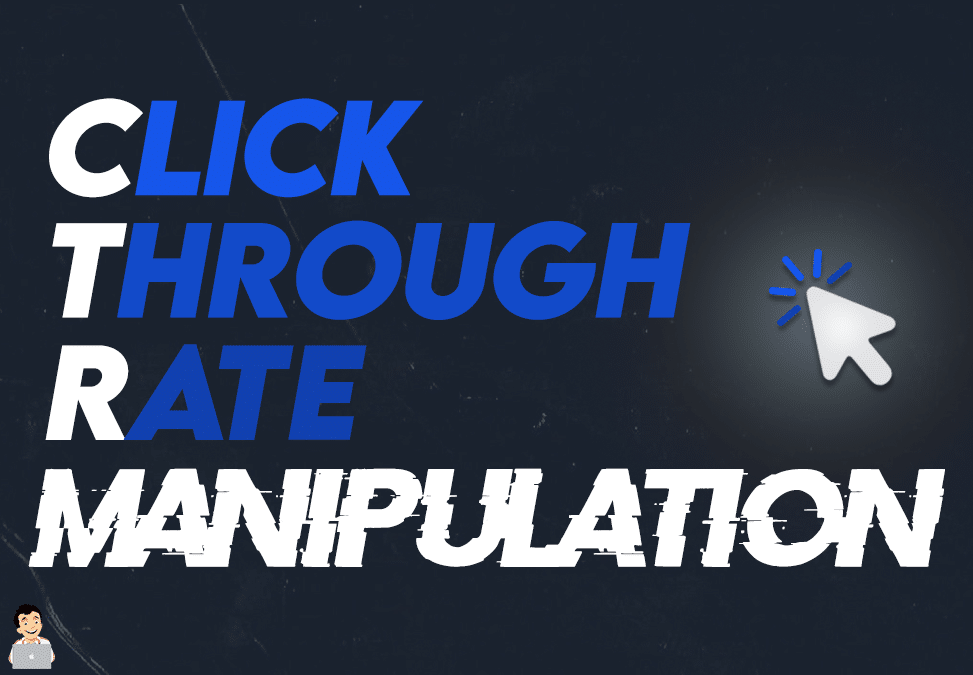LinkDaddy CTR Manipulation: Specialized Solutions for Enhanced Web Web Traffic
LinkDaddy CTR Manipulation: Specialized Solutions for Enhanced Web Web Traffic
Blog Article
Discovering the Relationship Between CTR Manipulation Services and Customer Habits
In the world of digital advertising and marketing, the impact of click-through rate (CTR) control services on customer behavior remains a complicated and interesting subject. As online systems progressively depend on CTR metrics to measure the success of content, items, and solutions, understanding just how these controlled rates influence user engagement and decision-making processes is critical. The interaction between CTR manipulation and customer behavior elevates inquiries concerning authenticity, trustworthiness, and the moral ramifications of such methods. By exploring the intricate partnership in between CTR adjustment solutions and individual behavior, fascinating insights emerge that may improve our understanding of digital advertising strategies and their effects on consumers.
Impact of CTR Control on Behavior
Examining the impact of Click-Through Rate (CTR) manipulation on customer behavior reveals critical understandings into the characteristics of online engagement. CTR manipulation entails artificially pumping up the variety of clicks on a certain link or advertisement to deceive customers and online search engine. This method can result in a distorted perception of a website's appeal or relevance, ultimately affecting customer actions.

Additionally, CTR adjustment can alter the data made use of by formulas to customize individual experiences. This can result in users being offered web content that does not straighten with their preferences or passions, eventually resulting in a decrease in customer fulfillment and interaction. Comprehending the effect of CTR control on individual habits is essential for preserving openness and trust fund in on-line interactions.
Individual Engagement With Manipulated CTR
User interaction with adjusted CTR information frequently results in manipulated perceptions of online content appeal and importance. When customers engage with content based upon unnaturally inflated Click-Through Fees (CTR), they may think that specific info, products, or solutions are more prominent or trustworthy than they in fact are. This can result in individuals choosing based upon misleading data, causing potentially unfavorable results.
Involvement metrics like likes, shares, remarks, and time invested in a webpage are frequently influenced by CTR control. Users may be much more inclined to engage with content that appears to have higher involvement rates, even more bolstering the cycle of skewed understandings. Because of this, content developers and advertisers might focus on creating web content that produces high CTR instead of focusing on developing truly useful and pertinent material.

Psychological Results of CTR Adjustment

Furthermore, the psychological results of CTR adjustment can additionally show up in modified decision-making processes. Individuals may be much more likely to click content only based upon its viewed appeal, instead of its actual value or importance to their demands. This behavioral change can cause a surface involvement with on-line material, where customers might ignore high-quality yet less popular offerings in favor of those with artificially enhanced CTRs.
Essentially, the emotional implications of CTR adjustment highlight the significance of keeping openness and credibility in on-line interactions to foster real individual involvement and depend on.
Moral Considerations in CTR Control
CTR adjustment increases problems concerning deceiving customers, misshaping data analytics, and endangering the reputation of on the internet content. By artificially blowing up CTR, customers might be misdirected ctr manipulation service into clicking on web links or ads they would not have actually chosen or else, leading to an insincere online experience.
One more honest aspect to contemplate is the fairness of manipulating CTR to get an unreasonable advantage over competitors. Participating in such methods not only breaches concepts of fair game however likewise threatens the depend on that individuals position in on-line systems. It is necessary for services and digital marketing professionals to support honest criteria in their methods to make certain openness, reputation, and long-lasting sustainability in the on-line atmosphere.
Implications for Digital Marketing
With the increasing reliance on electronic systems for advertising functions, the method of manipulating click-through rates (CTR) postures substantial implications for the effectiveness and honesty of electronic advertising and marketing strategies. CTR manipulation can cause skewed data analytics, misguiding online marketers into thinking that their projects are carrying out far better than they in fact are. This can cause misallocation of resources, with business buying underperforming strategies based upon falsified CTRs. Moreover, when individuals realize that CTRs have been manipulated, it can wear down depend on in the brand name, leading to long-term negative repercussions for consumer loyalty and brand name online reputation.
Additionally, the use of CTR manipulation solutions can develop an unjust affordable landscape, where companies that participate in such techniques obtain an artificial benefit over those that comply with moral marketing requirements. This can suppress development and creativity in digital marketing, as success becomes more about adjustment methods than delivering authentic value to customers. Ultimately, the implications of CTR control for electronic marketing extend beyond short-term gains, impacting the general sustainability and trustworthiness of advertising and marketing efforts in the electronic world.
Verdict
To conclude, the partnership in between CTR control solutions and user behavior is intricate and diverse. The impact of CTR control on habits, customer interaction with controlled CTR, mental results, moral considerations, and effects for electronic advertising and marketing all contribute fit this connection. Understanding these dynamics is important for marketing experts and scientists alike in order to navigate the honest ramifications and make the most of the effectiveness of their digital marketing approaches.
Report this page